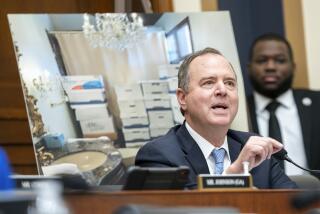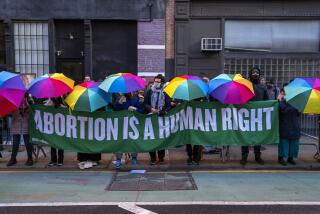Shades of blue
Today, Cannick and Perlstein discuss the ideological spectrum within the Democratic Party. Previously, they the causes of the party’s apparent national strength, the compatibility of progressive politics and traditional religious values, and whether Democrats have co-opted national security as a campaign plank from the Republicans. Tomorrow, they’ll debate the prospects of a long-term Democratic ascendancy.
Ideological diversity is good for the party
By Jasmyne Cannick
I think that most, if not all, Democrats would agree that priority No. 1 is ridding the county of this catastrophic administration and ensuring that we don’t endure another four years of conservative policymaking under right-wing power.
With that said, the modern American left, in my opinion, often serves as the conscience of the Democratic Party. Today’s left is very much a movement of economic and social justice.
How do the New Democrats fit into the contemporary left?
I’m not sure that I buy into the notion that the New Democrats have to fit into the modern left movement. I would argue that both are necessary, as they both add to the party. They act as a sort of checks-and-balances system for the party.
New Democrats have been described as the modernization of liberalism with a heavy focus on progressive policies. At the center of their platform is economic growth versus redistribution. This is followed by traditional American values -- personal responsibility, individual liberty, faith, tolerance, family and hard work. New Democrats want both an activist government and for those who benefit from government to give something back to their country and community. It was a message that evidently resonated with American voters in 1992 with the election of Bill Clinton, who championed the New Democrat philosophy.
But that was 1992, and 16 years later, we see the left’s movement invigorated with new life, thanks in part of the horrible policies of the Bush administration.
With America in a recession that no one wants to call by its proper name, a national mortgage crisis, an immigration emergency, a war that won’t end and more Americans uninsured and unemployed, the message of economic and social justice for all is resonating loud and clear with many Americans who feel the effects of the current administration.
The role of the left as the party’s conscience will be particularly important as we head into the 2008 convention in Denver to select a nominee. As the Democratic Party attempts to send American voters the message that it will provide national security and economic growth, you can count on the left to be front and center waving the banner for ending the Iraq war, defending our civil liberties, ensuring economic justice and universal healthcare, and fighting global warming. In other words, the left will continue to hold the party accountable and push forward a real progressive agenda.
Once we have our nominee, it will be up to the Democratic Party as a whole to put aside ideological differences for the time being and focus on the most effective strategy to capture the White House in November. That crucial goal is where all Democrats’ focus should be, regardless of where we fall on the political spectrum within our party.
Jasmyne Cannick is a critic based in Los Angeles who writes about pop culture, race, class and politics as played out in the African American community. She is a regular contributor to National Public Radio’s “News and Notes.”
Is The Times kidding?
By Rick Perlstein
In one of his many fantastical short stories, the Argentine fiction writer Jorge Luis Borges describes “a certain Chinese encyclopedia,” the Celestial Emporium of Benevolent Knowledge, which divides the world’s animals into the following categories:
1. Those that belong to the emperor.
2. Embalmed ones.
3. Those that are trained.
4. Suckling pigs.
5. Mermaids.
6. Fabulous ones.
7. Stray dogs.
8. Those included in the present classification.
9. Those that tremble as if they were mad.
10. Innumerable ones.
11. Those drawn with a very fine camel hair brush.
12. Others.
13. Those that have just broken a flower vase.
14. Those that from a long way off look like flies.
Exactly! That’s how The Times is asking me to describe the American left, by using a taxonomy that’s internally incoherent. “Is the American left now a movement of economic issues and nationalism, of identity politics and social justice, or something else?” Is “economic issues” counter-posed to “social justice,” by which I am supposed to presume them opposites? I choose not to choose. Economic issues are a subset of social justice. Social justice is unimaginable without economic justice. Isn’t that obvious?
What do The Times’ editors mean by “nationalism”? I tried to read their minds, and the only thing I can come up with is that perhaps they mean something like “isolationism” or “protectionism” -- that any left-leaning approach to economics tends toward either of these terms. If I am right in my surmise, well, then, liberals, the Los Angeles Times has just insulted you, because “isolationism” and “protectionism” are slurs that precious few Americans, except very few on the Buchananite right, would willingly claim. I may be working myself into a lather over nothing here, because perhaps that’s not implied in the question. But what is? I stared at this question for over an hour trying to make sense of it, and ended up simply scratching my head. Blew right through my deadline. Sorry, editors!
Anyone else see the problem here? How else does this question simply make no sense? The editors obviously mean something by “identity politics and social justice.” But identity politics is another phrase that tends in the direction of a slur -- it tends to describe people dumbly voting based merely on their sex or their race, something that is impossible, it’s supposed, for white men to do -- while social justice is something to which most citizens would say they at least aspire. But again, this bizarre question seems to lump them together as a common pole -- against the opposite of that meaningless pair “nationalism” and “economic issues.”
I’ve tried out the question on a few smart friends, and all of them responded with dumbfounded silence. If I were a freshman composition teacher, I’d give The Times a D-minus for logical incoherence and ask it to start over. Is there anyone to the left side of center for whom this question even makes sense? If so, let me know in the comments. I’m honestly baffled. The thought that no one responsible for this feature was able to stop short and notice the question makes no sense is a little disconcerting -- and suggests perhaps that The Times has no one to the left of center on its opinion staff, which is more disconcerting still.
Rick Perlstein is the author of the forthcoming “Nixonland: The Rise of a President and the Fracturing of America” and a senior fellow at Campaign for America’s Future.
| | | Day 4 |
More to Read
A cure for the common opinion
Get thought-provoking perspectives with our weekly newsletter.
You may occasionally receive promotional content from the Los Angeles Times.






